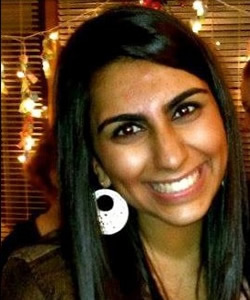When I tell people I am a senior at Georgetown majoring in Health Care Management and Policy and minoring in Spanish and Theology, I often get an eyebrow raise, followed by a confused look from the person with whom I am speaking. Although this academic scope seems broad and a bit random at times, I came to choose this academic path because it includes all of the disciplines that interest me. My sister is a nurse, so I was given exposure to the world of health care at a very young age, which grew into a strong fervor to heal the healthcare system (pun intended) over time. I also have been taking Spanish classes since the sixth grade, so I figured: why not continue on and become fluent? And then, there’s theology…now that one requires us to go all the way back to my freshman year at Georgetown.
During my first couple of days at Georgetown and amidst Hurricane Irene and loud orientation advisors that kept me up at night, the first prayer service I ever attended was a Hindu Puja the week after New Student Orientation. Why is that relevant? Well, you see, I’m not actually Hindu; I’m a Shi'a Ismaili Muslim. Ismaili prayer services are held every day in East Falls Church, Virginia, but there are specific distinctions in prayer from Sunni Islam that left me feeling like I couldn’t connect as strongly to the Muslim community at Georgetown as I had originally hoped. There wasn’t anything wrong with the way they prayed at Georgetown, but since it involved the Sunni method of practice, I felt like it was harder to connect with my faith the way I had when growing up. And when a Hindu friend dragged me to this puja service on a Sunday afternoon, my first thought was: “Well, I’m not even a little Hindu, so what do I have to lose?” After a bit of an internal ethical dilemma on whether or not it was kosher to go to another prayer service (read: will they try to convert me?), I reluctantly accompanied my friend of three days to her prayer service.
As I walked into the basement of McSherry Hall that day, I felt a calming presence overcome me; I soon began to engage with the rituals in my own way. I could see myself making each of the elements of the prayer service my own: in the meditation I called upon "Allah" instead of Krishna; the symbol of light and smell of incense reminded me of similar beliefs and practices in my own prayer services; and even the discussion that day focused on inter-religious dialogue, something I could contribute to as a Muslim. Over time, I continued to attend puja services, as I had found the community to be open to dialogue about other faiths, and soon I became interested in how Georgetown students connected to their faith. To me, this was the one time I saw my peers release themselves to something greater than anything else in their physical lives, and it was a humbling experience each time I attended. The following semester, I applied and received the position of interfaith coordinator of the Hindu Students Association (HSA) Executive Board. I was proud of my background as an Ismaili Muslim, but I wanted to do more with it, and this was my way to begin.
Simultaneously during this time, I wanted to learn more about what it meant to be at a Catholic, Jesuit institution. This curiosity developed into an urge to learn what it meant to engage particularly in the Jesuit value of “interreligious dialogue,” which I pursued by later becoming the chair of the Interfaith Student Association and eventually serving on the Campus Ministry Executive Committee as the Council of Advisory Boards (CAB) representative for Campus Ministry, a position I hold today. I attended conferences like the Interfaith Youth Core and the National Jesuit Student Leadership Conference, took classes like the one on "Religion in American Political Life," and even spoke at the President’s Interfaith Service Challenge at Georgetown last fall. All of these things allowed me to recognize that I simply love learning about religion and led me to this minor in Theology. Kind of crazy when you think about it, but it’s true!
Why do I mention this long-winded anecdote in my first blog post?
Well, I think it’s important to make the distinction that my interest in this program stems from the passion and love I have for dialogue on religion, but moreover, on the intersectionality of religion with whatever topic you can think of. It could be language or health care (as is primarily in my case), but it can also be in ethics, politics, gender, or the arts.
Throughout my four years here, I have grown a strong appreciation and value for not only other faith traditions but also my own, which I hope to culminate by looking at how healthcare ethics impacts the decision-making model for Ismaili providers around the globe. One of my future goals, and something I hope to gain from this program, is the last part of this interest: around the globe. To me, the Doyle Engaging Difference Program is not just about looking at how issues cross over but how the nuances they have in every part of the world. The global and international context of these issues is something I have yet to delve into, and I am hopeful that the other Doyle Fellows and this program will challenge me to seek out both the smallest and broadest of these realms throughout the year.

